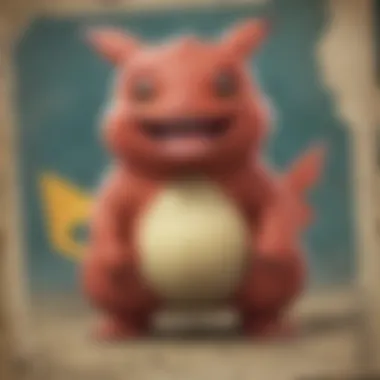Where to Sell Your Pokémon Cards Near You: A Comprehensive Guide


Intro
Selling Pokémon cards has become increasingly popular among collectors and casual sellers alike. The rise of interest in these iconic cards is undeniable. It reflects not only the nostalgia among fans but also an eagerness to engage in trading. By understanding where to sell you can maximize value and connect to the right buyers.
In this guide, we will explore accessible platforms and local avenues for selling Pokémon cards. We will cover important elements such as assessing card condition, knowing market value, and choosing the right selling channels. The ultimate goal is to equip you with usable insights to navigate the sales process effectively.
Understanding Pokémon Card Values
It’s essential to grasp the current market values of your Pokémon cards before attempting to sell. Values depend on several factors, considering both rarity and popularity.
The basic elements impacting price include:
- Card condition: Cards in mint condition fetch higher prices than worn-out ones.
- Rarity: Some cards are simply less abundant than others, raising their value.
- Demand: What buyers look for can change with trends in the community.
Understanding these factors allows you to set realistic expectations. Knowing when to part with certain cards, or hold onto them, is vital to maximize your potential profit.
When to Sell Your Pokémon Cards
Timing your sale is as crucial as understanding the value. Observe trends in local and online communities. Certain items rise in value after special releases or during events. If, for example, a new Pokémon game drops, interest in specific classic cards may spike.
Considerations for Timing:
- Stay aware of holiday seasons which generally boost collectibles sales.
- Monitor community enthusiasm for game releases via platforms like Reddit or Facebook.
- Attend local conventions or tournaments to gauge what players might be searching for.
Setting your sale at an optimal time enhances the likelihood of selling your cards for a good price.
Where to Sell Your Pokémon Cards Locally
Selling locally can be effective as it saves shipping costs. Local game shops often buy and sell Pokémon cards. This is an excellent option to consider. Here are some further local options:
- Local Game Stores: Establish relationships with store owners.
- Flea Markets: Often have avid collectors or curious players.
- Local Events: Check event calendars for trading fairs or showcases.
Overview of these environments can help determine which site fits your trading approach.
Digital Avenues for Selling
The digital marketplace continues to grow significantly. Numerous platforms are there for you.
- eBay: A well-known platform where you set bids or buy now.
- TCGPlayer: Suited for card listings and along with purchase options.
- Facebook Marketplace: Connect with buyers nearby without shipping.
- Reddit: The Pokémon Trading Card Game subreddit has members eager to trade.
Explore these online options thoroughly as each platform has its own advantages. You may find a selling process optimized at multiple front.
Understanding the Market for Pokémon Cards
Understanding the market for Pokémon cards is essential for anyone looking to sell their collection. Knowledge about the current landscape can significantly influence the selling process, maximizing individual card values and overall profit. Selling cards without this understanding may result in financial loss or dissatisfaction.
The Pokémon card market, like any collectible sphere, operates on various dynamics. Trends are in constant flux, driven by changes in demographics, pop culture phenomena, and market validations. Being aware of these currents helps sellers to present their items in an advantageous light.
In this section, we explore specific trends followed by key factors that can dictate the card values. A grip on these elements not only aids in pricing accuracy but also strengthens negotiating power during transactions.
Current Trends in Pokémon Cards
The Pokémon card market witnesses a lot of ongoing trends. Collectors today are focusing on specific set releases, especially those linked to recent events in the Pokémon universe. The nostalgia factor from childhood connections often plays a strong role. New expansions or reprints can shift player and collector interest, creating spikes in value for certain cards such as vintage Charizard or limited-edition Pikachu cards.
Moreover, the popularity of competitive play is leading many to seek playable cards over collectables. This shift means that certain common cards might be sold higher than before because players need them for decks. Following these trends offers insight into where demand peaks and helps inform your selling strategy.
Factors Affecting Card Value
Multiple factors contribute to how Pokémon cards are valued in today's market. Understanding these elements means you can leverage your knowledge when pricing your cards. The pivotal aspects include:
Rarity and Scarcity
Rarity is a fundamental characteristic that dramatically affects a card's value. Cards that appear less frequently in packs or have limited print runs are generally in higher demand among collectors. Scarcity enhances the race of acquiring particular cards, often leading to fierce competition that increases prices.
A concentrated demand for rare cards makes them more appealing on the second-hand market. Collectors will pay premium prices to acquire those pieces that complete their collections or fulfill sentimental aspirations. Keep in mind that while the scarcity of a card prompts desire, it does not always guarantee instant buyers. It is still essential to assess general market trends associated.


Condition and Grading
Condition directly impacts a card’s selling potential. Cards, in mint condition, fetch higher prices than those that show clear wear. Grading services like PSA provide an archive system guiding buyers in identifying card quality. A card rated high in this scale can command significantly more value.
Yet, acquiring professional grading does introduce an initial cost, and the grading does take time. Some sellers conduct their assessments but face difficulty without a precise valuation standard. Awareness of how grading can raise, or even lower, a card's price is necessary for informed decisions in transactions.
Market Demand
Market demand constantly fluctuates and can be influenced by various factors including social media hype or celebrity interest in collecting. Events, online discussions in communities such as Reddit, and resurgence in popularity due to anniversaries or new game formats can create increased demand.
Understanding current demand will help sellers align prices strategically. When cards stay in trend, demand can reach extraordinary heights, granted there's utility in those cards for play or nostalgia. For example, older promo cards may surge only during specific years returning from interest, holding their value for subspaces without as many active players. Monitoring these changes marks a beneficial strategy to enhance your trading practices.
Collecting Pokémon cards is not just an investment; it's intertwined with personal history and culture, which drives a deeper connection to value.
By comprehending these factors, your approach to selling Pokémon cards becomes smarter and far more grounded in reality, maximizing the opportunity for profit.
Local Selling Options
Selling Pokémon cards locally can offer unique advantages, as it allows you to connect directly with potential buyers. This process not only fosters community engagement but also facilitates faster transactions. When meeting people in person, you can build trust and establish rapport, leading to more positive outcomes.
Local selling options provide the opportunity to gauge buyer interest and receive immediate cash. Moreover, it's essential to consider factors like venue availability, customer demographics, and local gaming culture which all contribute to successful sales.
Game Stores and Comic Shops
Local game stores and comic shops serve as ideal environments for selling Pokémon cards. Many of these shops specialize in trading card games and have a devoted clientele. Visiting these shops lets you tap into enthusiasts who are always excited about adding cards to their collections. It's important, however, to understand each store's policies regarding sales and trade.
Advantages of selling in such stores include:
- Instant transactions: You receive cash on the spot.
- The chance to negotiate prices directly.
- Opportunity to build ongoing relationships with shop owners and other collectors.
Some stores may offer cash, while others might suggest store credit, allowing for future purchases. Approach shop owners with knowledge of your cards, as they will appreciate informed sellers and are more likely to make favorable offers.
Flea Markets and Trade Shows
Flea markets and trading card shows present alternative venues for selling your Pokémon cards. These events attract a variety of buyers, including treasure hunters and avid collectors looking for special finds. Setting up a stall at a flea market can be a straightforward way to showcase your collection. On the other hand, trade shows usually cater specifically to collectors and offer established foot traffic.
Here are key points to consider when selling at these venues:
- Cost and logistic planning: Determine stall fees and arrange a convenient method of display.
- Prepare for variability: Sellers may face fluctuating demand and competition.
- Engagement: Direct interaction with potential buyers can yield better results than online sales.
Success hinges on presentation. Additionally, you may even encounter experts who can assess your cards and provide insight into their collective value.
Local Pokémon Events
Local Pokémon events, such as tournaments or gatherings, offer fertile grounds for selling cards. These occasions draw large crowds of interested buyers. While the primary focus may be on gameplay, many participants seize the opportunity to buy, sell, or trade cards.
Participating in these events enables you to:
- Reach a dedicated audience passionate about Pokémon.
- Gain direct feedback from fellow collectors and players regarding your cards.
- Network with others who share similar interests, possibly leading to social connections or future sales.
Be sure to familiarize yourself with the event rules. Depending on the gathering, some events may have restrictions on selling, while others may welcome vendors. Other attendees may appreciate your presence, particularly if you offer sought-after cards. Increasing your local presence can spark interest in your collection, so keep an eye on schedules for product launches or exhibitions happening nearby.
Online Sales Platforms
Online sales platforms are crucial avenues for selling Pokémon cards. They expand your reach significantly, exposing your cards to a wider audience beyond just your local community. Each platform has unique benefits and features to consider. This versatility allows sellers to choose the best fit for their specific needs and circumstances.
Unlike in-person sales, online platforms often provide a more comprehensive marketplace. Sellers can experiment with listings, compare prices in real-time, and make modifications based on market response. Listing details and promotional strategies can greatly enhance visibility. It's essential to understand these elements as they directly impact the potential success of your sale.
eBay: The Global Marketplace
eBay is perhaps the most well-known platform for selling Pokémon cards. It serves as a global marketplace where sellers can connect with buyers from all over the world. Listing a card on eBay is straightforward. You can set an auction style or fixed price sale. The competitive environment boosts established card values.
One major benefit of eBay is the amount of information available about current card prices. Many sellers have taken advantage of eBay's scalability to sell entire collections or rare cards. However, sellers need to factor in fees and shipping costs when determining final profits.
Facebook Marketplace and Groups
Facebook Marketplace provides an alternative that localizes selling. With a simple interface, you can list your cards quickly. The immediate connection to a local audience allows for face-to-face transactions that can be reassuring. You have the option to negotiate prices live.


Moreover, numerous Facebook groups cater to Pokémon fans specifically. These groups are often engaged and active, making them ideal spaces for marketing your cards. Some groups restrict the type of listings, so you may find relevant conversations regarding pricing and rare finds. Yet, the platform is not immune to potential scams. Careful screening of buyers becomes essential.
Specialized Pokémon Card Websites
There are websites dedicated solely to trading and selling trading cards, offering an optimized experience for sellers focused on Pokémon products.
Troll and Toad
Troll and Toad specializes in not just Pokémon cards, but a wide range of collectibles. This platform allows users to list their cards alongside detailed price comparisons. This focus helps sellers understand true market values and set competitive prices.
A key characteristic of Troll and Toad is its user-friendly approach. The site even offers the ability to trade cards with other collectors. However, while it attracts a niche audience, its transaction fees can be higher compared to larger marketplaces.
CardMarket
CardMarket is immensely popular in Europe for trading card sales. It provides seamless transactions mainly focused around card games. This specificity helps build a tailored environment, avoiding the messiness often found on broader platforms like eBay.
One of its important aspects is market data transparency. Sellers can explore recent sales history to gauge pricing strategy. CardMarket tends to charge lower fees than some of its competitors, making it an attractive option. Some downside elements include limited international reach.
TCGPlayer
TCGPlayer stands out as an exceptionally robust marketplace for collectible card games, including Pokémon. It offers comprehensive data analytics and guides regarding card prices, which greatly assists sellers. This insight equips them with enhanced tools to optimize listings.
TCGPlayer’s community-oriented features allow feedback and review systems which create trust between sellers and buyers. It is incredibly beneficial for niche sellers looking for validation within the card game community. However, TCGPlayer does implement selling fees, meaning you should account for those in profit margins.
Evaluating Your Cards
Evaluating the condition and value of your Pokémon cards is crucial before you engage in selling. Each card carries its own worth that can vary dramatically based on certain criteria. Understanding these elements can maximize your potential profit.
Assessing Card Condition
Condition assessment is foundational in determining a card's value. Cards are categorized by grades that reflect their state, usually defined as Mint, Near Mint, Excellent, or Good. High-quality cards, especially rarities, can fetch a premium price. Here are a few factors to consider when assessing card condition:
- Surface Quality: Check for scratches, dents, or any damage on the card face.
- Corners and Edges: Look at four corners and the edge alignment. Sharp corners indicate a better grade.
- Centering: An evenly centered card features an equal border on each side, and this attribute can boost value.
Being precise in your evaluation can influence selling decisions significantly. A well-preserved card can look appealing and encourage higher bids, whereas a neglecte cards presence might deter offers.
Researching Card Prices
acquiring knowledge about current market prices is necessary for a successful selling strategy. Various online platforms provide insight on Pokémon card values based on recent sales. For example:
- eBay Sales History: Use the sold listings to determine price trends.
- Price Aggregators: Websites like Troll and Toad or TCGPlayer can consolidate prices from multiple listings.
Once you compiled the price info, it helps to set a realistic honor base price for your items. Ensuring that you can still gain a profit while remaining competitive in pricing is it key.
Grading Services: Are They Worth It?
Many sellers ask themselves if they should invest in professional grading services, such as PSA or Beckett. Grading can add credibility to your selling and typically offers more insightful price evaluations. Here's what to weight:
Benefits of Grading:
- Increased Sale Value: Professionally graded cards often reach higher sale prices compared with ungraded ones.
- Buyer Confidence: Many collectors prefer buying graded cards due to assurance of quality.
However, consider the drawbacks too:
- Cost and Time: Submitting cards for grading can be expensive and somewhat slow.
- Market Demand: Not all cards will see substantial benefits from grading, so assess each individually.
Selling Tips and Best Practices
Understanding how to sell your Pokémon cards is crucial for ensuring you get the best value. Implementing effective selling tips and best practices can significantly enhance your sales outcome. Being informed can be your key advantage whether you are a seasoned collector or a casual seller.
Setting the Right Price
Setting an appropriate price for your cards is fundamental. If your price is too high, potential buyers will quickly lose interest. Conversely, listing them too low could result in a loss of value. Evaluating the marketplace, recent sales of similar cards, and rarity will aid in determining an optimal price point. Make increments if needed. Adjusting price over time based on interest is advisable and important. Always be open to negotiate.
Creating Effective Listings


High-Quality Photos
The visual presentation of your cards plays a critical role in attracting buyers. High-quality photos should capture the details and the condition clearly. Natural lighting is best for showing cards without glare. Clean backgrounds can emphasize the features of the card, making it easier for the buyer to visualize ownership. Use a camera with sufficient resolution to prevent blur. Good images can significantly elevate trust from potential buyers. It encourages them to act.
Detailed Descriptions
A well-drafted description accompanies your listing and sets the buyer's expectation. Highlight key aspects, such as the card's condition, edition, and any unique identifiers. Write clearly and accurately to avoid misunderstandings. Including keywords purchasers might search can improve your listing's visibility. A structured format can facilitate easier reading and comprehension for users.
Communication with Buyers
Good communication can build trust when selling your cards. Always respond promptly to inquiries and provide clear answers. Demonstrating your willingness to help can speed up the seller-buyer relationship. Be polite but also honest regarding any flaws in the condition of your cards. Appreciating your buyer’s viewpoint can lead to a smoother transaction journey. Establishing this rapport can increase the likelihood of a positive review and likelihood of influencing future sales.
Transparency in communication is vital.
Following these selling tips will position you well in the market. Understanding each highly influences your selling experience. With careful pricing, effective listings, and strong communication strategies, selling your Pokémon cards can become more manageable and far more productive.
Legal and Ethical Considerations
Understanding the legal and ethical aspects of selling Pokémon cards is crucial for anyone looking to engage in this market. Knowing these considerations helps sellers protect themselves, builds trust with buyers, and ensures compliance with relevant regulations. Failure to consider these elements could lead to complications. Thus, this section shines light on both the foundational and more intricate aspects of selling cards. Being informed allows for smoother transactions.
Understanding Selling Regulations
Local laws and regulations often govern the sale of collectible items, which includes Pokémon cards. Comprehending these regulations is important to avoid any legal issues. Some primary aspects to consider are:
- Sales Tax: In many areas, selling collectible items could incur sales tax. Knowing how this affects your financial outcomes is essential.
- Consumer Protection Laws: These laws exist to protect buyers from fraudulent practices. Ensuring transparency can help adhere to these regulations.
- Licenses and Permits: Depending on your area, you may need specific licenses to sell such items, especially in marketplaces or stores. Researching this can prevent undesirable surprises.
Understanding these factors creates a safer environment for both sellers and buyers, enhancing the overall market experience.
Protecting Yourself as a Seller
As a seller, taking measures to shield yourself from potential risks is foundational. Adequate steps help establish a credible reputation and build long-term buyer trust. Here are two significant components of seller protection:
Secure Payment Methods
Using secure payment methods is a significant element of protecting yourself during card transactions.
- Characteristics of Secure Payment Methods: Options like PayPal, for instance, provide buyer and seller protection. Such features enhance safety during transactions.
- Benefits: Secure payment options often provide the ability to reverse the transaction if problems arise. This factor makes them favorable choices for many sellers.
- Unique Features: Different items, like credit cards or secure payment apps, can be relied upon. However, ensure you check their policies, as they can differ in terms of fee structures or fraud protections.
Choosing secure payment methods forms a barrier against financial mishaps, ensuring a more trustworthy transaction.
Fraud Prevention
In conjunction, fraud prevention plays a crucial role in creating a safe selling experience.
- Characteristics of Fraud Prevention: These efforts can involve measures such as verifying buyer identities and avoiding suspicious transactions. Maintaining vigilance is essential when dealing with unfamiliar buyers online.
- Benefits: Good fraud prevention strategies enhance seller security. Relying on trusted platforms also minimizes the chances of falling victim to scams.
- Unique Features: Enabling two-factor authentication or blocking suspicious accounts through reporting are proactive steps. Taking such measures adds a layer of security to all transactions.
Employing effective fraud prevention techniques safeguards your interests, illuminating the path for smooth trade relationships.
These considerations lead to enhanced security, increasing trust between buyers and sellers alike.
Post-Sale Considerations
In the process of selling Pokémon cards, the post-sale considerations hold significant importance. These decisions, made after the transaction, can heavily impact your overall selling experience as well as potential future dealings. Addressing topics like shipping and handling, as well as gathering feedback and reviews, is crucial. Efficient management of these functions not only ensures satisfied customers but can also enhance your reputation as a seller. Having a well-thought-out strategy for these considerations leads to a better experience for both parties.
Shipping and Handling
After a sale is finalized, shipping and handling become key players in the dialogue of card transactions. Properly executed shipping serves multiple purposes: it ensures the cards reach buyers in the agreed condition and protects the seller from potential disputes. Using adequate packing materials, like cardboard or bubble mailers, will prevent bending or damage during transit. This attention to detail is likely to earn trust from buyers and can prompt positive reviews.
Here are crucial points regarding shipping and handling:
- Packing: Use sturdy materials for packing to guarantee safety during delivery. Adding protective sleeves for rare cards is advisable.
- Labeling: Clearly label packages, ensuring addresses are accurate to avoid delivery mishaps.
- Tracking and Insurance: When shipping high-value cards, consider utilizing tracking services or shipping insurance. This can help in claim procedures should any issues arise during delivery.
- Shipping Options: Compare options from various carriers (like USPS, UPS, FedEx) to obtain the best pricing while ensuring swift delivery.
Overall, delivering each item as promised reinforces commitment to reliability, ultimately leading to growth in your customer base.
Feedback and Reviews
Gathering feedback and reviews post-sale is a method to gauge customer satisfaction and refine your selling strategy. Customers often rely on reviews while searching out trustworthy sellers. Thus, actively pursuing constructive input elevates your online presence and credibility.
To effectively manage feedback:
- Encourage Reviews: After the sale, kindly ask buyers to leave feedback. Often, promptness yields better responses. Sharing simple instructions on how to leave a review can be helpful.
- Address Concerns Promptly: If a buyer raises an issue, communicating swiftly shows your dedication to customer service. This action can mitigate dissatisfaction before it leads to negative feedback.
- Learn and Adapt: Use feedback to adjust practices. If multiple customers note shipping issues, this could suggest a need for improved packing methods.
In any business, reputation drives success. Embracing feedback leads to improvement in service and tackling complaints positively opens conversations that can build strong ties within the Pokémon community.







